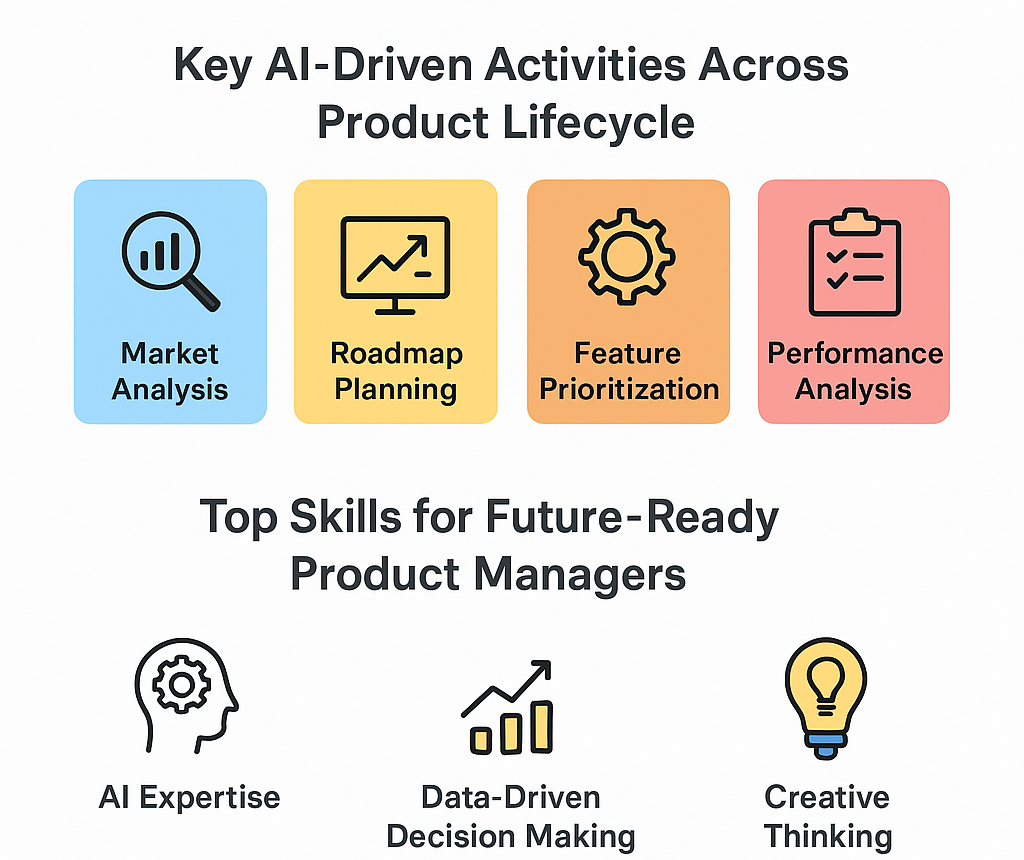
How Artificial Intelligence is Transforming Product Management
Artificial Intelligence is no longer a futuristic concept reserved for data scientists and engineers. Today, it has become a foundational pillar in reshaping product management roles across industries. Product managers, who were once focused primarily on gathering user requirements and translating them into roadmaps, now find themselves navigating a world where AI systems can predict customer needs, automate workflows, and even test product-market fit before launch.
The question is not if AI is changing product management, but how it is fundamentally reengineering the role. Intelligent automation enables product managers to transition from operational oversight to strategic leadership. Instead of manually sifting through feedback or market reports, AI-powered analytics delivers real-time insights, highlighting trends and user behavior patterns at an unprecedented scale.
For companies like Product Siddha, integrating AI into product management services unlocks faster iterations, more accurate forecasting, and greater customer satisfaction, all of which directly impact profitability and competitive positioning.
What Makes AI So Essential in Product Management Today
The modern product landscape is highly competitive. Products fail not because teams lack effort but because they lack timely insights and execution speed. This is where AI becomes indispensable.
- Data-driven roadmaps: AI tools process customer feedback, usage data, and competitor benchmarks to suggest feature priorities.
- Predictive analytics: Product managers can forecast adoption curves, churn risks, and market shifts before they occur.
- Customer personalization: Intelligent platforms tailor recommendations and experiences at scale, improving retention.
- Operational efficiency: AI automates repetitive tasks such as backlog grooming, A/B testing setup, and sentiment analysis.
By adopting AI automation services, organizations ensure that product managers no longer waste time on manual research but instead focus on designing impactful strategies that align with business objectives.
Why the Role of a Product Manager is Evolving
Traditionally, product managers were often described as the “mini-CEO” of a product, juggling market research, development priorities, stakeholder communication, and customer satisfaction. However, in the AI era, the boundaries of this definition are shifting.
AI is not replacing product managers but enhancing them. The new role requires deeper collaboration with AI systems to co-create product roadmaps. This shift also raises expectations: stakeholders now anticipate evidence-backed decisions rather than gut instincts.
The evolution also underscores why continuous learning is critical. Product managers must adapt quickly, mastering tools and frameworks that help them harness AI-driven insights effectively.
Get Benefits from AI in Product Management
AI doesn’t just benefit product managers, it elevates the entire ecosystem.
- Customers experience more personalized, relevant, and seamless products.
- Businesses gain efficiency, faster releases, and stronger ROI.
- Cross-functional teams (engineering, marketing, sales, design) benefit from alignment through shared AI-driven dashboards.
- Executives and stakeholders receive accurate forecasting and reduced risks during launches.
At Product Siddha, AI integration ensures that both internal teams and external users experience measurable value through improved retention and enhanced decision-making.
Where AI Delivers the Most Impact in Product Management
The influence of AI spans across all stages of product management:
- Discovery Phase: Identifying unmet customer needs through AI-driven social listening and trend analysis.
- Development Phase: Automating backlog prioritization and sprint planning with predictive modeling.
- Testing Phase: Running simulations and experiments with intelligent A/B testing platforms.
- Launch Phase: Forecasting adoption and detecting early warning signals of churn.
- Growth Phase: Optimizing retention through recommendation engines, targeted campaigns, and behavior-driven nudges.
AI essentially compresses what used to take months of research and testing into actionable insights within days.
Which Skills Matter Most for Product Managers in the AI Era
The rise of AI does not eliminate the need for product managers; it redefines the skills that set them apart. Among the most important are:
- Data Literacy – Understanding machine learning models, data structures, and how to interpret AI outputs.
- Strategic Thinking – Leveraging AI insights to align roadmaps with long-term business objectives.
- Collaboration Skills – Working effectively with data scientists, engineers, and AI platforms.
- Ethical Awareness – Addressing issues of bias, fairness, and transparency in AI-driven decisions.
- Adaptability – Continuously evolving to adopt new AI tools and workflows.
- Customer Empathy – Using AI to enhance, not replace, human-centered design.
At Product Siddha, product managers are equipped with the expertise to merge these skills with advanced AI automation services, creating a workforce capable of leading innovation.

Conclusion: The Future of AI and Product Management
The synergy between AI and product management is not a passing trend; it represents the foundation of future business success. AI is transforming how products are designed, launched, and improved. For product managers, the integration of AI means less guesswork and more precision.
For companies like Product Siddha, delivering advanced AI automation services ensures that clients can leverage this transformation strategically. The future belongs to those who embrace AI not as a replacement for human intelligence, but as a partner that empowers product managers to make better, faster, and more impactful decisions.
